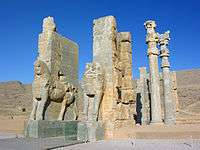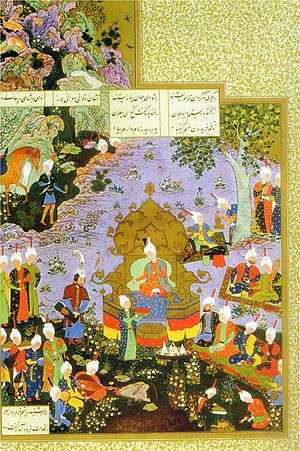Fereydun

Fereydun (Persian: فریدون - Fereydūn or Farīdūn; Middle Persian: Frēdōn; Avestan: Θraētaona), also pronounced and spelled Freydun, Faridon and Afridun, is the name of an Iranian mythical king and hero from the kingdom of Varena. He is known as an emblem of victory, justice, and generosity in the Persian literature.
Etymology
All of the forms of the name shown above derive, by regular sound laws, from Proto-Iranian Θraitauna- (Avestan Θraētaona-) and Proto-Indo-Iranian Traitaunas.
Traitaunas is a derivative (with augmentative suffix -una/-auna) of Tritas, the name of a deity or hero reflected in the Vedic Trita and the Avestan Θrita. Both names are identical to the adjective meaning "the third", a term used of a minor deity associated with two other deities to form a triad. In the Indian Vedas, Trita is associated with gods of thunder and wind. Trita is also called Āptya, a name that is probably cognate with Āθβiya, the name of Thraetaona's father in the Avestā, Zoroastrian texts collated in the third century. Traitaunas may therefore be interpreted as "the great son of Tritas". The name was borrowed from Parthian into Classical Armenian as Hrudēn.
In Zoroastrian literature
In the Avestā, Thraetaona is the son of Aθβiya, and so is called Āθβiyāni, meaning "from the family of Aθβiya". Originally, he may have been recorded as the killer of the dragon Zahhak (Aži Dahāk), but in Middle Persian texts, Dahāka/Dahāg is instead imprisoned on Mount Damavand in Amol.
In the Shahnāme
According to Ferdowsi's Shahnameh, Fereydun was the son of Ābtin, one of the descendants of Jamšid. Fereydun, together with Kāve, revolted against the tyrannical king, Zahāk, defeated and arrested him in the Alborz Mountains. Afterwards, Fereydun became the king, married Arnavāz and, according to the myth, ruled the country for about 500 years. At the end of his life, he allocated his kingdom to his three sons Salm, Tur, and Iraj.
Iraj was Fereydun's youngest and favored son, and inherited the best part of the kingdom, namely Iran. Salm inherited Anatolia ("Rûm", more generally meaning the Roman Empire, the Greco-Roman world, or just "the West"), and Tur inherited Central Asia ("Turān", all the lands north and east of the Amu Darya, as far as China), respectively. This aroused Iraj's brothers' envy, and encouraged them to murder him. After the murder of Iraj, Fereydun enthroned Iraj's grandson, Manučehr. Manučehr's attempt to avenge his grandfather's murder initiated the Iranian-Turanian wars.
See also
External links
- Stuart Cary Welch A king's book of kings: the Shah-nameh of Shah Tahmasp, 1972, Metropolitan Museum of Art (New York, N.Y.), ISBN 0-87099-028-4, catalog from an exhibition May 4-July 4, 1972 (open access), 201 pp, 49MB, contains material on 'Faridun' PDF pages 104, 112, 116, 120, 124
- First Iranian Legendary Heroes and Heroines: A Research Note by Manouchehr Saadat Noury
- Encyclopedia Iranica article
| Preceded by Zahāk |
Legendary Kings of the Šāhnāme 1800-2300 (after Keyumars) |
Succeeded by Manučehr |



.png)